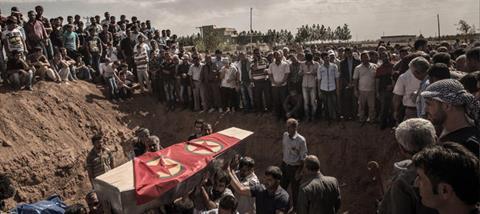
The Islamic State of Iraq and Syria (ISIS) have dominated the headlines throughout 2015, but the November attacks in Paris were a watershed moment. One hundred and thirty people died and more than 80 were seriously injured when ISIS terrorists stormed cafés, restaurants and the Bataclan theatre.
The attack came weeks after the downing of a Russian passenger plane in the Sinai Peninsula, and just days after a double suicide bombing in Beirut, Lebanon killed over 40 people. ISIS claimed responsibility for both attacks. This shocking barbarism has led some to term the group a mindless ‘death cult’. But scholar and Anglican priest Mark Durie says this view is a ‘triumph of religious illiteracy’.
In an article for Lapido Media which explained the religious basis for ISIS’ actions, Mr Durie wrote, ‘ISIS believes that killing disbelievers is a moral act, in accordance, for example, with Sura 9:5 of the Qur’an, which states: “Fight and kill the idolators (mushrik) wherever you find them.”’
In a lengthy piece for The Atlantic on ISIS’ intentions, journalist a caliphate. In re-establishing this ancient system of governance, ISIS view themselves as following in the footsteps of the original caliph – the prophet Mohammed. Unlike other Islamist groups, ISIS’ theology places a large emphasis on the end times. According to prophecies that ISIS believes will soon be fulfilled, ‘the crusader nations’ or ‘infidel horde’ will suffer defeat by the armies of Islam at Dabiq – a city near Aleppo in Syria. ISIS believes this future battle will signal the beginning of the end of the world. On a video showing the body of murdered aid worker Peter Kassig, a masked British ISIS member said, ‘Here we are, burying the first American crusader in Dabiq, eagerly waiting for the remainder of your armies to arrive.’ Some experts believe the international terrorist attacks like those in Paris are designed to lure the West into fighting ISIS in Dabiq. As part of their end-time beliefs, ISIS is anticipating the imminent arrival of both Jesus and the Mahdi. The latter is a messianic figure who ISIS says will lead them to final victory. Some readings of Islamic texts suggest Jesus will descend from heaven shortly after the battle at Graeme Wood wrote, ‘much of what the group does looks nonsensical except in light of a sincere, carefully considered commitment to returning civilization to a seventh-century legal environment, and ultimately to bringing about the apocalypse’.
Where did ISIS come from?
The genesis of ISIS can be traced back to at least 2004, when following the US-led invasion of Iraq, they were known as ‘al-Qaeda in Iraq’. After civil war broke out in Syria, the group expanded and crossed over the border. Around the same time, a rift with al-Qaeda developed. Al- Qaeda leaders wanted to impose some limits on the use of violence and focus the fight on non-Muslims. ISIS, on the other hand, embraced brutality and continued to murder Muslims and other ‘unbelievers’, including Christians. Following substantial military achievements by ISIS, they declared an Islamic State (or caliphate) headed by Abu Bakr al-Baghdadi in June 2014.
What do they want?
Baghdadi believes Muslims have sinned over the past 1,000 years by abandoning their ‘duty’ to establish Dabiq. He will then kill the antichrist and finally support the Mahdi in establishing ‘Islam and its justice’ over the whole world.
Christian leaders react to Paris attacks
‘Wherever there is such wickedness Christ suffers afresh in the suffering of every human being. In solidarity let us be the source of consolation.’
Justin Welby, Archbishop of Canterbury
‘Their sorrow may not be soothed by our well-meaning words but they will often be comforted by the practical support of friends, church and community. Pray that there will be comforters for all who mourn.’
Dave Roberts, Teaching pastor at The Bridge International Church in Paris
‘As a resident of France, I can tell you that the way French service personnel respond to a crisis such as this is extraordinary. Solidarité is a substantial value in French culture, and you can touch and taste it at such times.’
Gerard Kelly, Bless Network, France
Would Mohammed join ISIS?
Jeremiah J Johnston, author of Jesus and the Jihadis: Confronting the Rage of ISIS (Destiny Image) believes ISIS can only be understood and ultimately defeated by looking back 1,400 years to ‘the roots of the terrorists’ faith’. Speaking on Premier Christian Radio’s Unbelievable? programme, Mr Johnston said Westerners ‘don’t realise how theologically driven Islamic State is. The Church has been quiet for years, not wanting to offend Muslims in general. ‘If you want to see a case study of exactly how Mohammed desired Islam to be implemented, look at the Islamic State…Mohammed would not only join the Islamic State, he would lead it.’ But this claim is strongly denounced by Muslims across the world. Inayat Bunglawala, founder and chair of Muslims4UK says such statements sound ‘utterly outrageous’ for ‘normal, sane Muslims’. The debate over the relationship of ISIS to mainstream Islam continues. Last summer, David Cameron urged the BBC to refrain from calling the group ‘Islamic State’, arguing that Muslims would ‘recoil’ at the phrase being used to justify the ‘perversion of a great religion’. Barack Obama has also said ISIS is neither Islamic nor a state. The BBC now refer to the group as ‘so-called Islamic State’. The UK Parliament has voted to bomb ISIS in Syria. The armed conflict there has raged for five years, with no end in sight. In the meantime the Church of England synod has unanimously backed a motion calling for the establishment of safe routes for refugees fleeing countries including Iraq and Syria. But the Archbishop of Canterbury, Justin Welby stated it was likely that establishing ‘safe and legal routes to places of safety’ might lead to military confrontation. In 2016 world superpowers will be attempting to crush ISIS using their joint military force. Whether they will succeed in crushing the ideology at Islamic State’s core, is less certain.




























